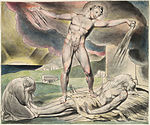Mastema
This article needs additional citations for verification. (September 2014) |
- For the moth genus, see Mastema (moth).
Mastema (Template:Lang-he Mastēmāh; Template:Lang-gez Mesetēma) is an angel who persecutes evil in the Book of Jubilees. He carries out punishments for God, as well as tempting humans and testing their faith. In the Zadokite Fragments and the Dead Sea Scrolls, he is the angel of disaster, the father of all evil, and a flatterer of God. He is said to have become a fallen angel. He first appears in the literature of the Second Temple Period as a personification of the Hebrew word mastemah (מַשְׂטֵמָה), meaning "hatred", "hostility", "enmity", or "persecution".
Book of Jubilees
According to the Book of Jubilees, Mastema ("hostility") is the chief of the demons engendered by the Watchers/fallen angels with women.
His actions and name indicate he is the Satan, the "Adversary", but in these religious works Satan is more like him who appears in the Book of Job with a function to fulfill under God than like Satan of later tradition who is the uttermost enemy of God. Beliar, mentioned twice in Jubilees, is likely to be identical with Mastema in this work.[1]
When God is ready to destroy all these demons after the flood and Noah prays that his descendants be released from their attacks, Mastema intervenes, beseeching God to allow him to retain and control one tenth of these demons in order to exercise his authority because they are "intended to corrupt and lead astray before my judgement because the evil of the sons of men is great". (Jubilees 10:8)[2] Mastema is the tester of humans, with God's permission.
Mastema sends a plague of birds onto the land in the days of Terah. (Jubilees 11:10)[3]
Later, Mastema counsels God to test Abraham (Jubilees 17:15-16),[4] just as Satan in the book of Job wants permission to test Job. As Abraham prepares to sacrifice his son Isaac, Mastema stands in God's presence. On his deathbed, Isaac promises that the spirits of Mastema will have no power to turn Jacob or his descendants away from Yahweh.
The strange account in Exodus 4.24 where Yahweh meets Moses by the way and tries to kill him is retold in a way that attributes the attack to Mastema instead (Jubilees 48:1-3).[5] It is claimed that Mastema aided the Egyptian priests that opposed Moses. Mastema is also said to have been chained while the Israelites left Egypt, but then let go to encourage the Egyptians to chase after the Israelites and so come to their doom in the Red Sea. The deaths of the firstborn of the Egyptians are attributed to "all the powers of Mastema".[1]
In fiction
- In Anne Rice's novel Vittorio the Vampire, Mastema is an angel that aids the main character in attacking a vampire coven.[6]
- In the Megami Tensei series of video games and its spin-offs, Mastema is portrayed as a demon, although, within the context of the franchise, the term "demon" is used in its classical meaning (cf. daemon) to refer to any supernatural creature. Mastema can be fought but can also join the player's group. In Strange Journey, Mastema plays a relatively big role in the story.
- In the Digimon game, Digimon Story: Cyber Sleuth, Mastemon is an Angel Digimon who manipulates light and darkness, and has the power to cross through space-time.[7]
- In the Yu-Gi-Oh! trading card game, the card "Darklord Nasten" (堕天使マスティマ, datenshi [= Fallen Angel] Mastema) is based on this demon.
- In the comic book Birthright, Mastema is the name of one of the mages living on Earth that maintain the barrier between worlds. She is revealed shortly after her introduction to be the daughter of the series' main villain.
- In Dorohedoro the city of Mastema is the place in which everyone present was transformed into mushrooms years before.
References
- ^ a b Michalak, Aleksander R. (2012). Angels as Warriors in Late Second Temple Jewish Literature. Mohr Siebeck. p. 173. ISBN 978-3-16-151739-6. Retrieved 12 May 2014.
- ^ "The Book of Jubilees Chapter 10". Retrieved 12 May 2014.
- ^ "The Book of Jubilees Chapter 11". Retrieved 25 May 2014.
- ^ "The Book of Jubilees Chapter 17". Retrieved 12 May 2014.
- ^ "The Book of Jubilees Chapter 48". Retrieved 12 May 2014.
- ^ Rice, Anne (1999). Vittorio the Vampire. Random House, Knopf. ISBN 0-375-40160-1.
- ^ Romano, Sal. "Digimon Story: Cyber Sleuth details and screenshots: Mirei and Rina, Tower Records, more Royal Knights". Gematsu. Gematsu.com. Retrieved 2 March 2017.

